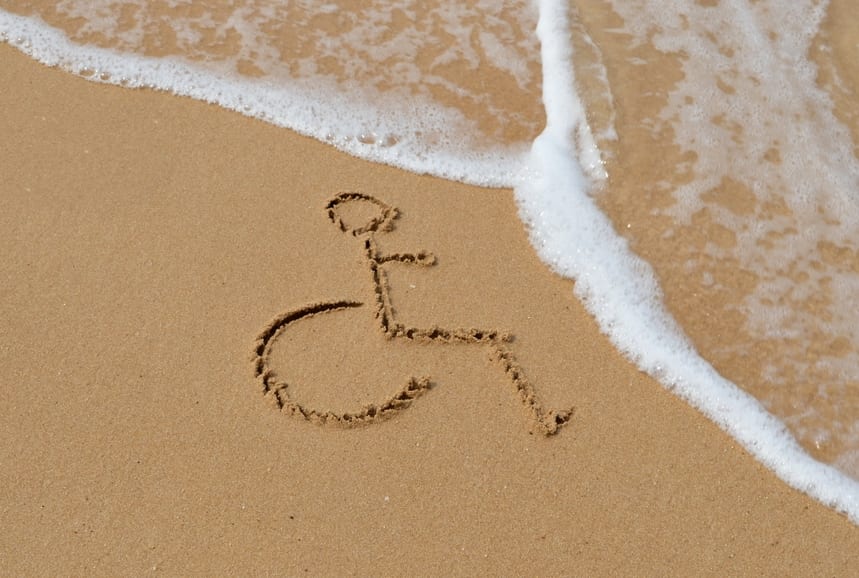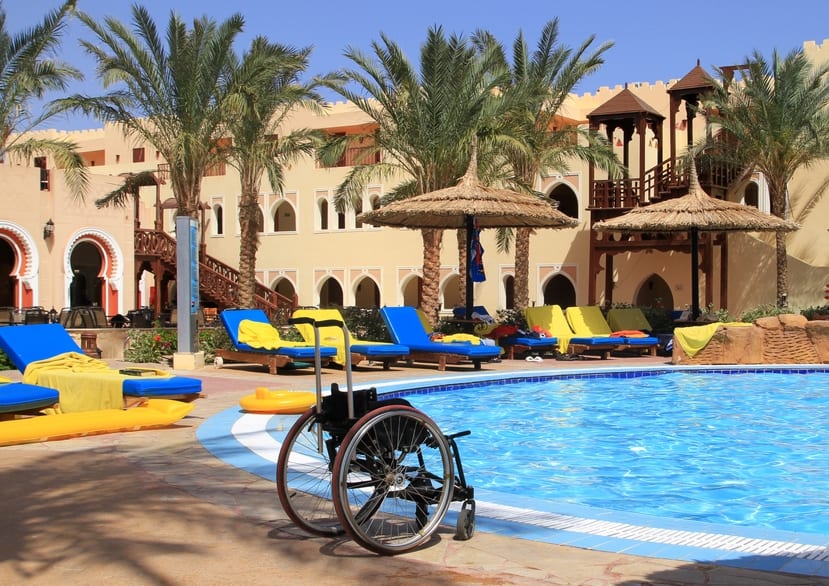Being able to travel without limits should be possible for everyone, whether you are able bodied or not. Unfortunately this wish often doesn’t translate into reality.
I’ve heard of cases that are frustrating or inconvenient for holidaymakers with reduced mobility, but the other end of the spectrum sadly sees disabled customers being treated with utter disdain by holiday providers, often being subjected to degrading circumstances. Such huge lapses in care for disabled people that wish to enjoy their holiday, just like anybody else, are completely unacceptable. Airlines and tour operators should strive to put a disabled person in the same position as somebody that is fully able, and they are obliged to do so by law.
It’s paramount that people with reduced mobility aren’t discouraged from booking a holiday because of fears around accessibility, and it’s equally important that, should the worst happen, holidaymakers are aware of their legal rights. As a leading consumer claims law firm we’re experienced in holding big businesses to account if somebody feels their needs were neglected while on holiday.
While Up In The Air: Passenger Rights
An air carrier or its agent/tour operator should not deny somebody a flight reservation or special assistance at the airport due to a disability. Passengers with reduced mobility should be the first on the plane, and the last off the plane, so they feel at ease and experience minimal disruption.
I’ve heard all too many cases in which airlines have neglected the needs of disabled passengers, some of which strike me as downright inhumane, such as incident concerning the BBC’s Frank Gardner, who was left on the plane after all other passengers had departed because special assistance staff failed to turn up.

With this in mind, passengers with reduced mobility should play their part in ensuring that everything is being done to make their travel as seamless as possible, forewarning an airline of any special requirements at least 48 hours prior to traveling, so that airlines have no excuses to fall back on. EC1107/2006 protects disabled persons and persons with reduced mobility when airborne, outlining that, “An air carrier shall not refuse, on the grounds of disability or of reduced mobility; to accept a reservation for a flight and to embark a disabled person or a person with reduced mobility at such an airport.”
If there is any damage to your wheelchair or walking aid, the airline is liable to pay compensation for the inconvenience caused and for the cost of repair.
Passengers with reduced mobility should be the first on the plane, and the last off the plane, so they feel at ease and experience minimal disruption.
Boosting passengers’ rights further is Article 11 of EU Regulation 261/2004, which states, “Operating air carriers shall give priority to carrying persons with reduced mobility and any persons or certified service dogs accompanying them, as well as unaccompanied children.” Similarly, Article 9 of the Regulation states that persons with reduced mobility should be given the right to care as soon as possible.
The Equality Act 2010 Protects Disabled Holidaymakers
Section 29 of the Equality Act 2010 is crystal clear on the point that disabled holidaymakers deserve first and foremost to enjoy a holiday just as an able-bodied person would. It states, “Where a physical feature puts a disabled person at a disadvantage in comparison to a person who is not disabled, there is a requirement to take steps as is reasonable to avoid the disadvantage”.
Examples of these “steps” that tour operators must take to make a disabled person as comfortable as possible include putting them in a ground floor room if necessary, or in a room with a designated disabled-access bathroom.
If there is any infringement to the Equality Act, a claim can be made. An interesting caveat to the Act is that “injured feelings” can be claimed for, so the Act not only takes into account accessibility and physical needs, but also doesn’t diminish feelings of upset and disappointment.
Campbell v Thomas Cook Tour Operations Ltd 2004 highlighted how injured feelings can provide significant grounds for a claim. The customer, who suffers with arthritis and struggles with walking and standing, had booked a holiday in Tunisia, but at Monastir Airport, she was treated badly at the hands of Thomas Cook staff.
Having told a staff member that she was in pain and couldn’t stand for much longer, her worries were dismissed as she was told that nothing could be done, and there was no attempt to source a wheelchair. The customer then found the pain too unbearable, so she sat on a luggage weighing platform, but was soon asked to stand. Fellow passengers were helping her rather than airline staff, and after a four hour ordeal, she was exhausted, with aches in her legs and hips.
When she returned to the airport the next day, she was anxious after her ordeal and then endured bouts of projectile vomiting. After a lengthy legal process against the tour operator for discrimination, the customer was awarded £7,500 in compensation for injury to feelings. The Judge said that compensation was awarded as Thomas Cook representatives failed to show “common humanity” and make any reasonable adjustments for Campbell.
This case in particular was significant as it sets a precedent that despite the discrimination taking place outside of Great Britain, the Equality Act 2010 still applies due to the package holiday being purchased in Britain.
It’s fantastic to see the law in action protecting passengers with reduced mobility – but note that the limitation period for the Equality Act is six months, which means that a dissatisfied holidaymaker wishing to make a claim must do so within six months of returning home.
Is The Holiday “Fit For Purpose?”
Legislation that is firmly on the side of holidaymakers is the Consumer Rights Act 2015. Under this, there is an explicit obligation from the “trader” to supply a service with “reasonable care and skill”. Tour operators are expected to advise consumers about appropriate holidays and accommodation in line with their individual needs, including reduced mobility or disability.
Inform the tour operator of the details of any disabilities before booking the holiday, what it means for them in what they can or cannot provide and what you specifically need as a result. Ensure that this is in writing (email is fine too) and keep the tour operator’s written response.
A consumer could be owed damages if a holiday isn’t “fit for purpose” if all parts of the contract, such as the promise of ramped access or mobility equipment, have not been delivered.
A Breach Of Contract
The Package Travel and Linked Travel Arrangements Regulations 2018 is beneficial to holidaymakers as it dictates that a package travel contract must not be altered without the express agreement of the traveller before the contract’s conclusion.

Aspects of a holiday that cannot be altered includes the location and main features of the accommodation, travel itinerary and excursions included in the package’s price, whether the trip is generally suitable for persons with reduced mobility and the suitability of the trip taking into account a traveller’s needs. Something to ask yourself is, “Did the airline or tour operator make ‘reasonable adjustments’ to make sure I was comfortable?” If the answer to this is no, you may be able to look into making a claim.
My Advice To People Travelling With Reduced Mobility
Travel issues for those people with reduced mobility must be eradicated. In July this year, a man with Parkinson’s disease was left to crawl through Heathrow Airport after his flight had been cancelled – in 2019, how can somebody be let down so badly and be on the receiving end of such inhumane treatment?
Inform the tour operator of the details of any disabilities before booking the holiday, what it means for them in what they can or cannot provide and what you specifically need as a result. Ensure that this is in writing (email is fine too) and keep the tour operator’s written response.
If there is an accessibility issue, or any of your needs haven’t been met, e.g. a hotel not granting you a ground floor room if required, I would advise submitting an internal complaint to a holiday representative as soon as possible. Taking notes and photographs of issues you encounter, alongside writing diary entries could put you in a more favourable position if there is a claim to be made later on. Complaining while still on holiday gives the hotel or tour operator the opportunity to rectify the problem; put this in writing on your return too.
If you haven’t received a response from the tour operator within 28 days, you can instruct a solicitor to act on your behalf. Lastly, don’t settle with an unsatisfactory holiday or experience – you have paid for a holiday which by nature should be enjoyed, and it is the tour operator’s duty to deliver this.
